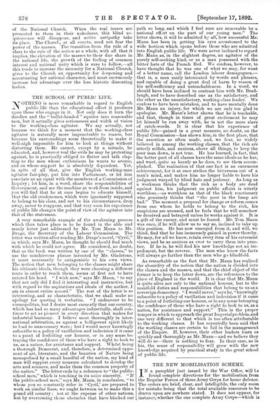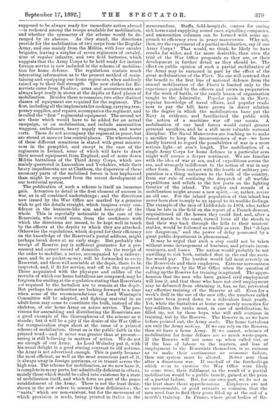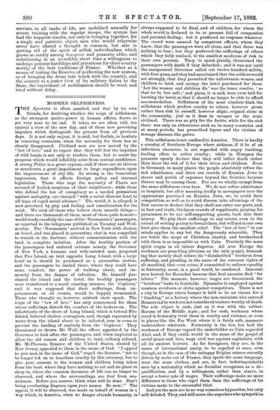THE NEW MOBILISATION SCHEME.
INa pamphlet just issued by the War Office, will le found complete directions for the mobilisation from the Regular Forces of three Army Corps for home defence. The orders are brief, clear, and intelligible, the only room for mistake being that the total available resources to be drawn upon are nowhere stated. It does not appear, for instance, whether the one complete Army Corps—which is supposed to be always ready for immediate action abroad —is reckoned among the troops available for mobilisation, and whether the symmetry of the scheme would be de- ranged by its absence. As they stand, the directions provide for the mobilisation of two corps from the Regular Army, and one mainly from the Militia, with four cavalry brigades, leaving a surplus of seven regiments of cavalry, nine of regular infantry, and two field batteries, which suggests that the Army Corps to be held ready for instant foreign service is now included in the scheme of mobilisa- tion for home defence. The regulations contain much interesting information as to the present method of main- taining and equipping our home regiments, when suddenly raised up to their full strength. The new clothes for Re- servists come from Pimlico; arms and accoutrements are always kept ready in stores at the depots or fixed places of mobilisation. Besides these necessaries, two other distinct classes of equipment are required for the regiment. The first, including all the implements for cooking, carrying tem- porary supplies, and repairs, accompanies the regiment, and is called the " first" regimental equipment. The second set are those which would have to be added for an actual campaign, or on mobilisation, and include ammunition waggons, ambulances, heavy supply waggons, and water carts. These do not accompany the regiment in peace, but are stored at more or less central places. The whereabouts of these different munitions is stated with great minute- ness in the pamphlet, and except in the case of the regiments in Ireland, some of which will have to draw their second equipment from England, and of some dozen Militia battalions of the Third Army Corps, which are mainly quartered in Lancashire and York-shire, while their heavy impedimenta are at Chatham, the dispersion of these necess.ary parts of the mobilised forces is less haphazard than might be supposed from the recent development of our territorial system.
The publication of such a scheme is itself an immense gain. Attention to detail is the first element of success in war, as in all combined undertakings ; and the directions now issued by the War Office are marked by a genuine wish to get the details straight, which inspires every con- fidence in the business-like aim and bona-fides of the whole. This is especially noticeable in the case of the Reservists, who would seem, from the confidence with which the directions are issued, to be kept well in touch by the officers at the depots to which they are attached. Otherwise the regulations, which depend for their efficiency on the knowledge of the Reservist's postal address, might perhaps break down at an early stage. But probably the receipt of Reserve pay is sufficient guarantee for a per- manent and correct record of domicile. On the receipt of the order to mobilise, a notice, accompanied by a railway- pass, and 3s. as pocket-money, will be forwarded to every Reservist, and these will assemble at the depOt, there to be inspected, and, if fit for service, sent off to the regiment. Those acquainted with the physique and calibre of the recruits of which our home battalions are composed, may be forgiven for smiling at the regulation stating that Reservists not required by the battalion are to remain at the depot. But perhaps the authorities are looking forward to a time when some of the recommendations of Lord Wantage's Committee will be adopted, and fighting material in an adult form may come to constitute the bulk, instead of the skeleton, of our home Army on active service. The pro- visions for assembling and distributing the Reservists are a good example of the thoroughness of the scheme as it stands ; but it will be a pity if the desire of the War Office for reorganisation stops short at the issue of a printed scheme of mobilisation. Great as is the public faith in the printed word—and it never was greater than at present— seeing is still believing in matters of action. We do not see enough of our Army. As Lord Wolseley put it, with his usual delight in a good staring contrast to old notions, the Army is not advertised enough. This is partly because the most efficient, as well as the most numerous part of it, is always away in foreign garrisons, or in transit across the high seas. The scheme for mobilisation, as we now have it, is complete in many parts, but admittedly deficient in others, mainly those which would be called into existence by a state of mobilisation itself, and which form no part of the peace establishment of the Army. There is not the least desire shown in the new orders to conceal these deficiencies ; the "units," which are non-existent, but for the movement of which provision is made, being printed in italics in the memorandum. Staffs, field-hospitals, centres for curing sick horses and supplying sound ones, signalling companies, and ammunition columns can be formed with some ap- proach to efficiency even in peace man ceuvres. Why not, then, try the experiment of a partial mobilisation, say of one Army Corps ? That would, we think, be likely to have results far wider, and far more desirable, than even the trial of the War Office proposals as they are, or their development in further detail as they should be. The effect on public opinion of such a partial mobilisation of the Army may be surmised in part by the effect of the great mobilisations of the Fleet. No one will contend that the benefit to the first line of national defence from the annual mobilisation of the Fleets is limited only to the experience gained by the officers and crews in preparation for the work of battle, or the yearly lesson of organisation taught to the Admiralty. Popular pride in the Navy, popular knowledge of naval affairs, and popular readi- ness to pay the bill, have grown in direct relation to the degree in which the mobilisations have put the Navy in evidence, and familiarised the public with the notion of a maritime war off our coasts. A mobilisation of our land forces would entail greater personal sacrifices, and be a still more valuable national discipline. The Naval Manceuvres are teaching us to make a sacrifice to keep the inconveniences of war—we have hardly learned to regard the possibilities of war in a more serious light—at arm's length. The mobilisation of a single Army Corps for home defence in a particular area might well arouse a deeper sentiment. We are familiar with the idea of war at sea, and of expeditions across the sea, and strangely indifferent to the notion of war in any other form. Even contact with the bustle of military pre- paration is a thing unknown to the bulk of the country, from our rule of confining the despatch of all warlike expeditions and reliefs to the few ports on the fighting frontier of the island. The sights and sounds of a mobilisation might arouse a new spirit,—or, rather, revive an old one. For the inland population of this island has never been slow to reply to an appeal to its warlike feelings. The example of the men of Lidderdale in 1804, who, rather than be late in the field on the report of a French descent, requisitioned all the horses they could find, and, after a forced march to the coast, turned loose all the steeds to find their way back through the hills to their masters' stables, would be followed as readily as ever. But "delays are dangerous," and the power of delay possessed by a great public department is phenomenal.
It may be urged that such a step could not be taken without some derangement of business, and private incon- veniences, and losses. The nation would probably be not unwilling to risk both, satisfied that in the end the sacri- fice would pay. The burden would fall most severely on the Reservists and their employers. Extreme nervousness is always shown by the War Office when the question of calling up the Reserve for training is agitated. The appre- hension that the men who have gained civil employment will lose it, and that those who have not civil employment may be debarred from obtaining it, has, so far, prevented any effective training of the Reserve at all. Even for a week's drill in the use of the new rifle, the numbers called out have been pared down to a ridiculous limit yearly. Yet, while the battalions at home are merely nurseries for boy-soldiers, the ranks must, in case of mobilisation, be filled up, not by these boys, who will still continue in training, but by the Reserve. The Reserve is, as we have before pointed out, the Army made. The home battalions are only the Army making. If we can rely on the Reserve, then we have a. home Army. If we cannot, schemes of mobilisation for home defence are so much waste-paper. If the Reserve will not come up when called out, or if the loss of labour to the masters, and loss of employment to the Reservists themselves, is so ruinous as to make their continuance an economic failure, then our system must be altered. Better now than after a disastrous war. If one-half of the forebodings which seem to exercise the War Office were likely to come true, their fulfilment as the result of a partial mobilisation would be a public benefit, gained at the price of a partial failure. But, for our own part, we do not in the least share those apprehensions. Employers are not so unreasonable, or good servants so common, that the men need fear to find their posts filled up at the end of a month's training. In France, where great bodies of Re- servists, in all ranks of life, are mobilised annually for severe training with the regular troops, the system has had the happiest results, not only in bringing together, for a single and patriotic object, men who would otherwise never have shared a thought in common, but also in getting rid of the spirit of selfish individualism which grows so rankly among bourgeois and peasants alike, and substituting in an incredibly short time a willingness to undergo genuine hardships and privations for their country worthy of the best traditions of France. Whether as a means of testing the Reserve, of perfecting the new system, or of bringing the Army into touch with the country, and the country to a juster view of its military duties to the State, the experiment of mobilisation should be tried, and tried without delay.




































 Previous page
Previous page